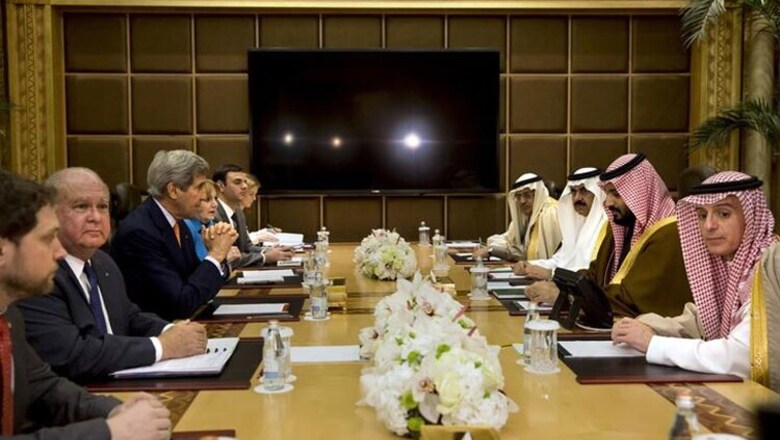
views
The international community has been alarmed by the sharp escalation in tensions in the Middle East. The Saudi-Iran rivalry has presented itself in the proxy ways in Iraq, Syria and Yemen, however the increased tensions over the killing of the Shia cleric has bought both countries into a direct verbal confrontation. The fear lies in the fact that this verbal confrontation may turn violent.
Though the risks of confronting a potentially nuclear capable Iran are great, the escalation in the sectarian tensions may actually be in Saudi Arabia’s short-term interest.
Saudi Arabia has long been concerned about the growing influence of Iran. Their fears escalated several notches after the nuclear deal with the US was announced. Now with the removal of sanctions, Iran can be re-integrated into the global economy. The Saudi government was openly critical about the nuclear agreement.
The deal comes at a time when the US has also recognized the importance of Iranian cooperation to defeat the ISIS. Considering the significant influence Iran has on Assad, any deal on Syria has to involve Iran. The execution of the cleric and the subsequent diplomatic crisis is a Saudi tactic to reassert their influence over the regional players.
The strong support received from Qatar, UAE, Bahrain and Sudan, Saudi Arabia has successfully isolated Iran diplomatically. In the wake of the thaw in Iran-US relations, the tensions are a strong message to the US regarding Saudi Arabia’s influence over regional players.
If there is anything the Saudi Monarchy fears, much more than Israel, it is the forces of the Arab Spring. The fall of Mubarak, Gaddafi and Abidine Ben Ali instigated similar demands for a more democratic regime throughout the Middle East. For the Saudi Monarchy, this is a direct challenge to their power.
During the initial days of the Arab Spring, the Monarchy was able to keep revolts at bay by rolling out generous subsidies and financial benefits. The strong position of the oil market enabled them to make such moves.
Today however, the situation is a lot different. The oil prices have fallen to a record low, below 28 dollars a barrel. Though supply is at an all time high, there is a falling demand. Fall in oil revenues means that the Saudi government is not in a strong financial position.
This directly impacts the subsidies and financial benefits the government was rolling out to keep opposition at bay. Apart from economic benefits, the only other way the Saudi Monarchy can maintain its position is by raking up the Sunni nationalist sentiments.
Being a Sunni majority state, a pan Sunni nationalism will get a lot of support from the population. Saudi Arabia also has a 15% Shia minority, a population grossly neglected by the Monarch.
The Sunni majority share a strong fear of a revolt from the Shia minority group. Therefore, by creating this diplomatic crisis, the Saudi government has successfully gained support from the Sunni majority.
They have harnessed the popular fear of a rising Iran and an internal Shia rebellion (supported by the Iranian government), to create a Sunni nationalist sentiment. This will help the Monarchy keep dissent at bay, at least for the short run.
Looking back at this strategy there are two questions that emerge.
Firstly, will Sunni nationalism keep dissent at bay in the long run? Secondly, what does this mean for the conflicts in Syria, Iraq and Yemen?
Dealing with the first question, Sunni nationalism alone will not keep dissent at bay in the long run. To prop up this nationalistic sentiment, the Saudi government will have to fund Sunni groups in Yemen, Syria and Iraq.
Economically, this is not going to be sustainable in the long run. The costs of engaging in these conflicts will increase the strain on an already struggling economy. If anything the increased economic strain may fuel the growing dissent.
On the second question, the tensions have already delayed the Syrian peace process. The growing Iran-Saudi tensions may result in both sides intensifying the proxy war. This will mean increased fighting in Yemen, Iraq and Syria.
Though the current diplomatic crisis might help the Saudi government keep dissent at bay in the short run, it will prove counter productive in the long run. The escalated tension is not going to significantly impact the thaw in Iran-US relations.
The US has recognized the importance of Iran in the war against the ISIS. For a long term solution to their domestic and external challenges, the Saudi government will have to think of a more sustainable solution that will have to involve a restructuring of their economy and making space for public participation in the government.
(The author holds a M.Sc. degree in International Relations from the London School of Economics. He can be contacted on [email protected])
















Comments
0 comment